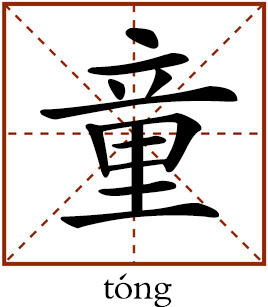Child

This character usually refers to a child between the stages of birth and puberty.
牧童遥指杏花村
mù tóng yáo zhǐ xìng huā cūn
Mu tong refers to a shepherd boy. Yao means remote and zhi is to point in a direction. Xinghuacun is a name for a village, literally, a village of blossoming apricot trees.
This is a famous line from “In the Rainy Season of Spring” by Du Mu (803–852), a leading Chinese poet of the late Tang Dynasty. Qing Ming Festival is an important day for the Chinese to offer sacrifices to their ancestors.
In this poem, Du Mu describes the despondent state of the lonely protagonist who hurries on with his journey in the drizzling rain. This contrasts with the situations of others, who are reunited with their families. This expresses the poet’s bitter emotion of missing his family as he is alone in a foreign land. “It drizzles endlessly during the rainy season in spring,/ Travelers along the road look gloomy and miserable./ When I ask a shepherd boy where I can find a tavern,/ He points at a distant hamlet nestling amidst apricot blossoms” (trans. Yang Xianyi, Gladys Yang).
The first line portrays the season and the weather to create a bleak atmosphere. In early April, the rain is falling lightly, which describes the natural background but also the emotional tone of the entire poem.
The second line shows us the protagonist’s identity as a pedestrian and the state of the road, highlighting his sad state of mind. “Look gloomy and miserable” and “travelers” are two keywords that are easily overlooked in this poem. “Look gloomy and miserable” means the soul has left the body, indicating bitterness. It is closely related to the word “travelers” which actually read in this poem as “xing ren,” an official position in ancient China. Du Mu explores this identity, willing to express his inner conflict inspired by his official duties and the fact that he can not be reunited with his family.
From the last two lines, we see that Du Mu wants to drink away his sorrows. However, the “distant hamlet nestling amidst apricot blossoms” symbolizes a place he might feel at more peace, providing the reader with a flash of hope.
Since then, Xinghuacun has remained a symbolic place of refuge due to the prominence of Du Mu’s poem.
edited by NIU XIAOQIAN
